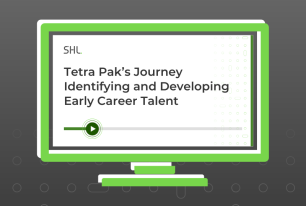Neurodiverse Recruitment: Research to Understand the Candidate Experience
One of our research priorities in 2020 was to create a new application form on SHL Direct. Learn how it can help us understand the assessment experience of a neurodiverse candidate.
Share
Earlier this month I co-chaired a session in the 2021 Society for Industrial and Organizational Psychology annual conference titled “Thinking Outside the Box: I-Os Improving Employment for Neurodiverse Individuals”. This session brought together a group of I-O Psychologists with a variety of perspectives to highlight applied research related to the employment of the neurodiverse candidates and raise awareness of what I-O Psychologists can do to change the face of disability employment.
As I sat surrounded (virtually) by colleagues who are dedicated to this area of study, one thing became clear. As a leading assessment provider, SHL has a unique opportunity to further the applied research in this area. SHL’s Research Leader, Sara Gutierrez, joined the session to share more about why inclusive hiring is a business priority for SHL, provide examples of some of our current research projects, and outline our research agenda.
We have a responsibility to our clients, their candidates, and our fellow I-O Psychologists to make this research a priority, and we do not take this lightly. Since launching our Neurodiversity Research Program in 2019, I am contacted on a regular basis by colleagues (both internal and external to SHL), clients, and researchers who are interested in learning more about what SHL is doing in this important area of diversity and inclusion. April is Autism Acceptance Month, so I’d like to take this opportunity to highlight some of the current projects in SHL’s Neurodiversity Research Program.
We have a responsibility to our clients, their candidates, and our fellow I-O Psychologists to make this research a priority, and we do not take this lightly.
One of our research priorities for 2020 was to create a new application form on SHL Direct, our practice test site where job seekers go to familiarize themselves with the types of tests they can expect as part of a hiring process. The new application form provides an option for candidates to disclose a disability before beginning a practice test. Collecting this information enables us to learn more about the relationship between self-disclosed disability status and experiences with various assessment types. Thousands of participants completed SHL Verify—cognitive ability tests—with this application form in 2020.
Preliminary results show that candidates in this small sample of job seekers who disclose autism when attempting practice assessments earn similar scores and report similar perceived opportunity to perform to the best of their ability across three types of cognitive ability tests, compared to those who did not disclose a disability. These are encouraging findings which show some early evidence in support of our SHL Verify tests as fair assessments for this talent pool. However, more research is needed.
This research is ongoing and will be conducted with a variety of other assessment types in 2021. We will be looking to expand this research to include other disabilities (e.g., dyslexia, dyspraxia) as soon as enough self-disclosed data becomes available. Also, interested clients will be able to use this application form to provide candidates with the option to disclose a disability for research purposes as part of the pre-hire assessment process.
For our next project, we are looking to connect with individuals to help us better understand the experiences and reactions of professional level (employed or job seeking) individuals with an autism diagnosis. This planned research study has the following objectives:
- Explore candidate reactions to a variety of specific assessments by a neurodiverse talent pool
- Explore candidates’ willingness to disclose their disability in relation to the assessment type, and preferred accommodations
- Explore preferences across various assessment types
If you meet the eligibility criteria and are interested in participating in this study, or if you would like to help us recruit participants, please contact me to learn more.









